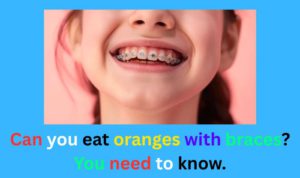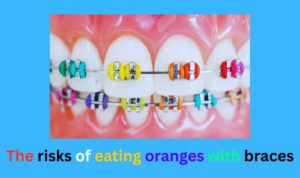If you wear braces, it’s crucial to pay attention to foods that you eat in order to not damage your braces or trigger discomfort. One of the most common questions that we get from braces wearers is: Can you eat oranges with braces? Oranges have health benefits, although the fruit’s acidity and texture can make them a challenge. In this blog, we are going to discuss things to consider when eating oranges with braces.
Can you eat oranges with braces? You need to know.

Knowing if you can eat oranges with braces is the key to saving your mouth and braces. Oranges are very beneficial to health but may interfere with your treatment if you do not consume them carefully due to their acidity and texture. Caring for foods such as oranges can help avoid excessive discomfort, limit the chances of damaging your braces, and even help keep your orthodontic journey in check. Read on for the reason this information matters to anyone with braces.
Why you should care about what you eat with braces
What you eat has a direct impact on your treatment when you wear braces. Some foods can ruin your braces by breaking a wire or bracket, and that can set you back on your treatment. Foods that are sticky or chewy, or anything that must be bitten into, are particularly troublesome because they put excess pressure on your braces and can be painful. These foods can also contribute to plaque build-up, making oral hygiene more difficult to manage.
A healthy diet can be followed to avoid complications as well. Being mindful of what you eat can help you avoid discomfort as well as keep your braces intact. This keeps your treatment on schedule and assists you in getting the best results in the shortest length of time. Being careful with your food can make orthodontic treatment easier.
The nutritional benefits of oranges for your health
Is the nutritional value of oranges good for health or not? They are a great source of the immune system-building vitamin C that fights off infections. Orange contains antioxidants, which can help reduce inflammation and protect the body from harmful free radicals. Such vegetables also contain high amounts of dietary fiber, which is known for its helpfulness for the digestive system and gut health.
Vitamin C-rich oranges are helpful in boosting skin health as well by stimulating the production of collagen in the body. They are also low in calories and contain natural sugars that supply a quick burst of energy. Thanks to their hydrating nature and abundance of vitamins and minerals, oranges are a welcome addition to any healthy dietary intake.
Can you eat oranges with braces?
Yes, you can eat oranges with braces, as long as you’re careful. Oranges contain vitamin C and various nutrients that are good for your health. But if your braces are new or if your mouth is sensitive, their acidity can irritate the gums. It’s just as important to pay attention to how you eat your oranges, too. Eating them in smaller, more manageable pieces also helps you not put pressure on your braces and helps you maintain them.
Also Read: Is Tropicana orange juice pasteurized
Other than eating these vitamin-C rich foods in moderation, it’s best to steer clear from biting right into whole oranges since it can damage braces. Instead, slice into smaller pieces or enjoy orange juice. This allows you to continue enjoying the benefits of oranges without inflicting damage on your braces or teeth.
The risks of eating oranges with braces

Oranges can pose risks when wearing braces; they’re acidic and slippery. Understanding these risks is crucial in preventing complications throughout your orthodontic treatment.
Here are the risks of eating oranges with braces:
- Selected with irritating ingredients for sensitive gums.
- Those capable of affecting braces’ components.
- Difficult to chew, resulting in bracket damage..
- Braces can trap sticky residue.
- Foster plaque accumulation around the brackets.
- Possibility of increased sensitivity of teeth.
In brief, although oranges are a healthy fruit when consumed. Those with braces should be careful, as the health benefits of oranges can lead to avoidable stomach pain and even damage to your braces.
How to safely eat oranges with braces?
You can eat oranges with braces if you take care. By hitting the correct notes, you also receive their penological benefits while preserving your braces from any damage.
- Cut oranges into small, manageable pieces.
- Do not take a huge bite of the fruit.
- Try fresh orange juice instead.
- Brush your teeth every morning and after meals.
- Wipe the Brackets with a Soft Cloth.
- Eat in moderation to avoid discomfort.
These precautions allow patients to safely consume oranges without concern of damaging their braces or negating their oral health.
Are oranges too acidic for people with braces?
Despite being mildly acidic, the acidity of oranges can cause concerns for those with braces. The acid can aggravate the gums — particularly if your braces are new or your mouth is sensitive. Frequent exposure to acidic foods can erode the enamel on your teeth over time, which is a risk if they are not cleaned correctly.
But oranges do still have plenty of health benefits, and you don’t need to avoid them entirely. The key is moderation. You can also reduce acidity by cutting the orange into smaller pieces, consuming orange juice instead of the whole fruit, etc. After eating oranges, as a means of minimizing damage to your braces and teeth, rinse your mouth with water.
Best ways to cut oranges for braces wearers
If you or your child wear braces, it’s important to cut oranges because this will help prevent your braces from breaking you and consequently result in your vehicle going out of order. So here are some simple cutting techniques to make eating oranges easier and safer.
Here are the best ways to cut oranges for braces wearers:
- Cut into thin, manageable wedges.
- Slice the orange and divide it into sections.
- Cut into small bite-size pieces.
- Use a knife to cut, not your teeth.
- Instead, stab huge segments of orange.
- Take out the seeds before you eat.
In this way, you can both enjoy oranges while having braces without damaging your orthodontic appliance or your teeth.
Can eating oranges lead to gum irritation with braces?
Yes, people with braces may experience gum irritation as a result of eating oranges. The acidity level of oranges makes your gums sensitive, especially if your braces are new or your mouth is already tender from the braces. The citric acid in fruits might result in a burning sensation on the gum tissue, making it difficult to relish the fruit without irritation.
But this irritation can generally be reduced when eliminating pieces of orange cut in small sections, not to mention orange juice. It is also helpful to rinse your mouth out with water after consuming oranges to remove any possible remaining acid. Eating oranges while being aware of how you do it can lower the chances of an irritated gum, but still enjoy the benefits oranges have to offer to your health.
Protecting your braces while eating fruits like oranges
They need to be protective of their braces while munching on fruits like oranges. Citrus fruits are acidic and can irritate your gum line and the inside of your mouth, especially if you have braces. If it seems too chunky and gets caught or hurts your mouth, try cutting the orange up into smaller pieces and eating it instead of biting right into it. This puts less pressure on your braces and will keep them in good condition.
Also, it’s a good idea to rinse your mouth out with water after eating citrus fruits. Doing so helps neutralize the acidity while washing away leftover particles. Maintaining oral hygiene is really important when you have braces, as it will help to keep your braces and teeth clean and free from any possible complications during your treatment.
The effect of citrus acidity on your braces
Citrus fruits such as oranges, lemons, and grapefruits are extremely acidic, which can impact your braces. These fruits contain acid that can soften the enamel of your teeth and make them more prone to damage. The citric acid damage caused by the fruit can damage the brackets & wires of your braces too, causing pain or injury over time.
Furthermore, eating acidic food often may increase the chances of tooth decay and staining near your braces. To reduce those risks, it’s best to swish water around your mouth after eating citrus fruits and to wait a little while before brushing your teeth since you don’t want to brush the softened enamel.
Can you eat other acidic foods with braces?
Yes, you can eat acidic foods with braces, but moderation is key. Tomatoes, pickles, and vinegar-based dressings also fall under the acidic category and can not only wear down tooth enamel but also irritate your gums and brackets. Eating these types of foods should be fine, however, repeated consumption could cause problems such as tooth metro genesis or tooth decay.
Acidic foods are considered enemies of braces and jaws, and they need to be rinsed with water as soon as they are consumed. So don’t be tempted to brush right after you have eaten something acidic, as this could damage your enamel. If you’re worried about the effects, talk to your orthodontist, who can provide more personalized guidelines based on your treatment plan.
Conclusion
In conclusion, yes, you can eat oranges with braces as long as they are cut into smaller pieces! Meanwhile, the citric acid in oranges can irritate gums and erode enamel, which puts teeth at a greater risk of any sort of damage. Peel small pieces off the orange and then rinse your mouth with water in order to get something stuck in your braces. Do not brush right after, as it can also wear down your enamel. After all, keeping your braces healthy is the goal here.
FAQ
Can I eat oranges with braces on?
Ans: You can eat oranges with braces, but you should slice them into small pieces and rinse your mouth after eating to reduce acid exposure and protect your braces.
What fruit can you eat with braces?
Ans: You can consume soft fruits, including bananas, berries, and grapes. Just skip hard or sticky ones, such as apples or pineapples, that can hurt your braces or get stuck in them.
Do oranges stain braces?
Ans: Oranges generally don’t stain braces, but their acid may irritate your gums and soften your enamel. For more on how to protect your teeth, rinse your mouth out after you eat.
What cannot we eat in braces?
Ans: Avoid hard,, sticky, or chewy foods, such as popcorn, caramel, and chewing gum. They could harm your braces or get stuck in your wires, causing complications.
Can I eat Doritos with braces?
Ans: Doritos are hard and crunchy which is why you should refrain from eating them when wearing braces. The chips may break or damage the brackets and wires of your braces.
